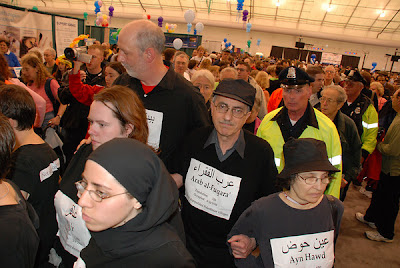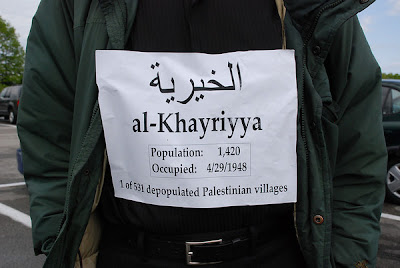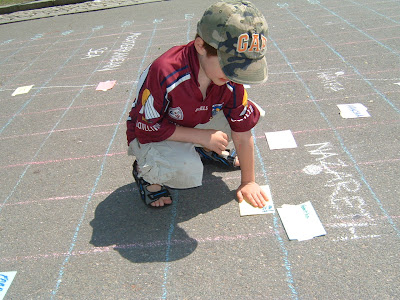PHOTOGRAPHS BY JONATHAN MCINTOSH AT http://jonathanmcintosh.smugmug.com/gallery/2877575
PHOTOGRAPHS BY SKIP SCHIEL AT http://teeksaphoto.org/RecentPhotos/CelebrateIsraelAction_5_22_06/index.html
VIDEO BY MAZIN QUMSIYEH AT http://www.youtube.com/watch?v=_9lsB4HVhDQ




Press release: For immediate release
Contact: m20action@gmail.com
From: New England Commemorates the Nakba
On Sunday May 20th several carloads of non-violent protestors headed to Foxboro to voice their support for Palestinians at the Israeli day celebration taking place at Gillette Stadium.
Israeli “
and the other said:
Palestinian Refugees
1948 - 800,000
2007 - 6 Million +
Right of Return for all Refugees
Previously dubbed “Boston Celebrates
Three quarters of the Palestinian population was expelled in 1948 and 531 of their villages destroyed. Today, these Palestinian refugees and their descendents number more than six million and are displaced throughout the world while
As US taxpayers we say, “NOT WITH OUR MONEY!”
Those of us who are Jewish say, “NOT IN OUR NAME!”
As people who care about equality and justice we say, "NOT ON OUR WATCH!"
FULL STATEMENT FROM ORGANIZING COMMITTEE:
We are here today to commemorate the expulsion and dispossession of the Palestinian people from their homeland and to protest this celebration of
We are a diverse group of people who support the application of human rights for all people. We are painfully aware that the establishment of a Jewish state in 1948 led to the largest and most persistent refugee problem in the world. In 1948, 800,000 Palestinian people were driven from their homes in a process of ethnic cleansing that continues to this day.
The right of return for refugees is an international law that applies to all refugee populations in the world. The United Nations has reaffirmed this right specifically for Palestinian people every year since 1948, yet the Israeli government has consistently refused to implement this right. Billions of dollars of
Those of us who are Jewish say, “Not in our name!” The organized Jewish community that has planned this event does not speak for us.
As US taxpayers we say, “Not with our money!” The 15 million dollars PER DAY that the
As people who care about equality, justice, and human rights, we say, "Not on our watch!" Israel must respect international law, including the right of return for refugees.
We are here today to declare that Palestinian experience cannot be forgotten, that Palestinian history cannot be erased, that Palestinian voices cannot be silenced! Never again should this kind of catastrophe happen to any people in the world.
And we are here to let the organizers of this event know that they will never be able to celebrate the establishment of the state of











